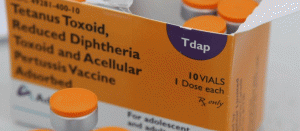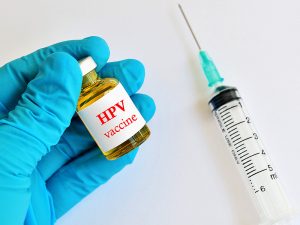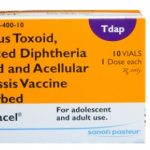Requiring Tdap May Increase HPV Vaccination in Adolescent Girls
About 9 in 10 people will get a human papillomavirus (HPV) infection at some point in their lives, according to the Centers for Disease Control and Prevention (CDC). HPV infections are associated with health problems, including several types of cancer in men and women, which means HPV infection is an urgent health problem. A new study shows that teenage girls were more likely to start the HPV vaccine series in states where schools required the meningococcal vaccine and/or the tetanus, diphtheria, and pertussis (Tdap) booster prior to admission.
 Nationwide, 63 percent of girls have received at least one dose of the vaccine, and half of all boys have started the series. Low HPV vaccination coverage is an urgent public health problem and improving HPV vaccination rates will save lives. The nation’s high Tdap vaccination rate of 86 percent shows that high HPV vaccination coverage is possible.
Nationwide, 63 percent of girls have received at least one dose of the vaccine, and half of all boys have started the series. Low HPV vaccination coverage is an urgent public health problem and improving HPV vaccination rates will save lives. The nation’s high Tdap vaccination rate of 86 percent shows that high HPV vaccination coverage is possible.
Most cervical cancers, anal carcinomas, and oropharyngeal cancers are the result of infection with high-risk HPV strains. While vaccines capable of preventing HPV related cancers are available, low usage limits their utility.
Previous attempts at improving HPV vaccination included state laws requiring the vaccine, but many of these laws allowed for exemptions for any reason. Because parents could opt out for nearly any reason, these state laws have been largely ineffective at increasing HPV vaccination coverage.
Improving HPV Vaccination Coverage by Vaccinating Against Other Diseases
To identify policies that could improve suboptimal HPV vaccination rates, the authors of the study sought to evaluate the relationship between adolescent vaccination and states’ school entry requirements. In the study, published in the medical journal Pediatrics, researchers compared HPV vaccination coverage in teenage girls aged 13 to 17 years across states with different vaccination requirements for school entry.
The authors gathered information from published data regarding school entry requirements from the Immunization Action Coalition (2007-2012) and vaccination rates from the National Immunization Survey-Teen (NIS-Teen, 2008-2012). They analyzed Tdap booster and meningococcal vaccination rates and evaluated the possibility of increasing HPV vaccination rates by “spillover effect,” meaning schools that require vaccinations as a condition of attendance could have higher rates of HPV vaccination.
The Results
The researchers found that requiring vaccination for admission to school did indeed improve vaccination rates for HPV. Vaccination requirements also boosted coverage for Tdap and meningococcal vaccinations.
coverage for Tdap and meningococcal vaccinations.
Compared with other states, those states with Tdap booster and meningococcal vaccination had a 22 and 24 percentage point increases in coverage for these vaccines, respectively. States with HPV vaccination requirements had less than 1 percentage point increase in coverage. Requiring Tdap booster and meningococcal vaccinations caused an 8 and 4 percentage point spillover increases for HPV vaccination coverage.
The study was limited in that it failed to account for confounding variables, such as religion, ethnicity, and parental education. Furthermore, the study did not account for the types of school attended, as homeschooled adolescents and teens attending private schools may not be subject to the same vaccination requirements. Despite these limitations and considering the controversy surrounding HPV legislation, utilizing the spillover effect from meningococcal and Tdap vaccination may be an effective approach to improving HPV vaccination coverage.
SOURCE:
http://www.cdc.gov/vaccinesafety/vaccines/hpv-vaccine.html
http://www.cdc.gov/hpv/infographics/vacc-coverage.html
Frank Magliochetti is Managing Partner for Parcae Capital.
-
North Andover, Massachusetts
This column of posts is directed at the Healthcare Industry. Frank plans to release a new site dedicated to the industry. He currently assists companies who are building, restructuring, transforming and resurrecting there business’s. An example of his client base are, Xenetic Biosciences , IPC Medical Corp, Just Fellowship Corp, Environmental Services Inc., Parsons Post House LLC, ClickStream Corporation as well as having a business talk radio show; The Business Architect on the URBN network.








